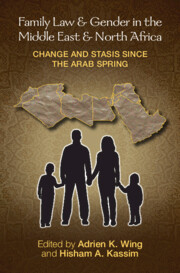Book contents
- Family Law and Gender in the Middle East and North Africa
- Family Law and Gender in the Middle East and North Africa
- Copyright page
- Contents
- Contributors
- Acknowledgments
- Introduction
- 1 Sustained Reforms
- 2 Family Law in Egypt
- 3 Women’s Rights in the Moroccan Family Code
- 4 Postponing Equality in the Algerian Family Code
- 5 Juristic and Legislative Rulemaking
- 6 The Status of Muslim Women in the Mosaic of Islamic Family Law in Lebanon
- 7 In Circles We Go
- 8 The Palestinian Minority in Israel
- 9 West Bank and Gaza Personal Status Law
- 10 Qatari Family Law, When Custom Meets Shari′a
- Glossary
- Bibliography
- Index
5 - Juristic and Legislative Rulemaking
A History of the Personal Status Code of Iraq, 1959–2022
Published online by Cambridge University Press: 18 May 2023
- Family Law and Gender in the Middle East and North Africa
- Family Law and Gender in the Middle East and North Africa
- Copyright page
- Contents
- Contributors
- Acknowledgments
- Introduction
- 1 Sustained Reforms
- 2 Family Law in Egypt
- 3 Women’s Rights in the Moroccan Family Code
- 4 Postponing Equality in the Algerian Family Code
- 5 Juristic and Legislative Rulemaking
- 6 The Status of Muslim Women in the Mosaic of Islamic Family Law in Lebanon
- 7 In Circles We Go
- 8 The Palestinian Minority in Israel
- 9 West Bank and Gaza Personal Status Law
- 10 Qatari Family Law, When Custom Meets Shari′a
- Glossary
- Bibliography
- Index
Summary
The 1959 Iraqi Personal Status Code was controversial at enactment, and it remains so to this day. Some of the controversy relates to its progressive elements, which include a ban on child marriage, expanded child custody rights granted to mothers, and limitations on polygamy. Another significant dimension to the controversy, less remarked upon in scholarly and media circles, concerns the extent to which the Iraqi state should have the power to legislate at all with respect to personal status matters, and instead to defer to traditional religious authorities for rulemaking. This chapter highlights some of the key rules of the Personal Status Code, its evolution over time, its treatment in the courts, and the controversies that continue to surround it. The chapter shows that in many ways, the challenges facing the Personal Status Code reflect the cleavages that have posed an existential threat to Iraq since its creation.
- Type
- Chapter
- Information
- Family Law and Gender in the Middle East and North AfricaChange and Stasis since the Arab Spring, pp. 93 - 112Publisher: Cambridge University PressPrint publication year: 2023



